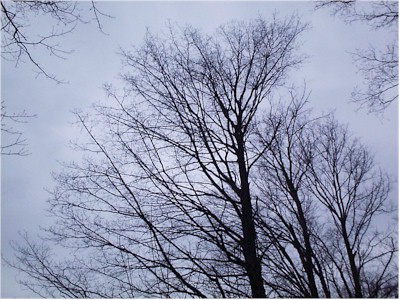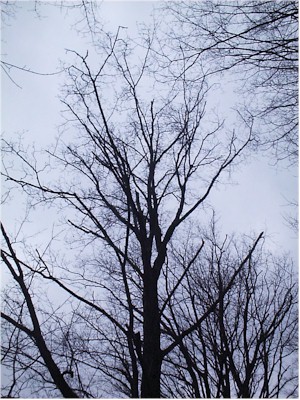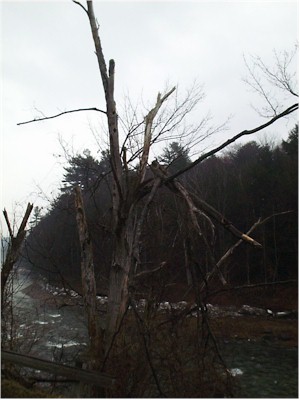
photo by Gerry Hawkes - April 2, 2000
A Common Sequence of
Decline and Death in Sugar Maple
(Acer saccharum)
Photos taken near Woodstock, Vermont
Since the mid-1970's the rate of sugar maple decline and death has been increasing. First this was most evident along streets and highways where the trees were subjected to multiple abuses from construction and pollution, but since the late 1980's, decline and death of sugar maples has become more and more prevalent far from roads. This seems to indicate widespread pollution as the underlying cause, especially since many other species of trees are also declining and dying simultaneously.
The following photos illustrate a typical decline and death scenario, but trees also may die suddenly, snap off or uproot without showing many advance signs of declining health.

photo by Gerry Hawkes - April 2, 2000
A sugar maple just
starting to show signs of dieback in its crown.
Note limbs on the right side of the tree which have plenty of
space and light yet they are dead.
If you look on the left side of the crown, just below the top you
will see there are fewer small twigs than there should be in a
healthy tree.
While trees like this can at least temporarily recover some of
their appearance of health under favorable conditions, the
general trend has been for their condition to worsen with time.

photo by Gerry Hawkes - April 2, 2000
After several years the
crown will often be reduced to this.
Now there is no hope of recovery.

photo by Gerry Hawkes - April 2, 2000
A sugar maple barely
holding on to life.
The full impact of widespread tree death is seldom noticed by the
public since trees near public thoroughfares and in other public
locations are quickly removed before they become safety hazards.
Even in the forest, dead and dying trees are quickly broken and
toppled by storms so that they are no longer visible in the
canopy of a hillside forest viewed from a distance.
. . . back to AIR POLLUTION AND FOREST HEALTH NOTES FROM AROUND THE WORLD
. . . to Eco Systems' Home Page
Contact Gerry Hawkes: ghawkes@eco-systems.org